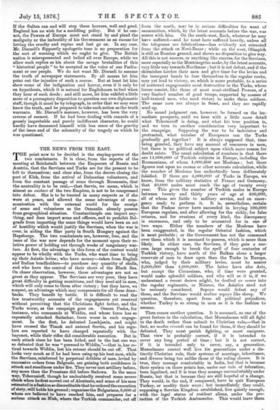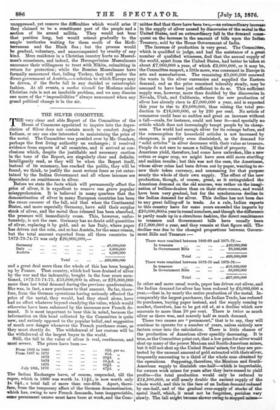THE NEWS FROM THE EAST. T HE point now to be
decided is the staying-power of the two combatants. It is clear, from the reports of the meeting at Reichstadt between the Emperors of Russia and Austria, that the Servians and Turks are for the present to be left to themselves; and clear also, from the decree closing the port of Klek, from the arrival of Dalmatian volunteers, and from the constant passage of arms through Roumania, that the neutrality is to be real,—that Servia, we mean, which is almost an enclave of the two Empires, is not to be compressed into defeat. She is to be treated in many respects as if she were at peace, and allowed the same advantage of com- munication with the external world for the receipt of arms and volunteers as the Osmanlis already possess from geographical situation. Constantinople can import any- thing, and does import arms and officers, and to prohibit Bel- grade from importing the same things would have been an act of hostility which would justify the Servians, when the war is over, in aiding the Slav party in South Hungary against the Hapsburgs. The two combatants are, however, free, and the issue of the war now depends for the moment upon their re- lative power of holding out through weeks of sanguinary war- fare. At first, the advantage in this form of the contest would appear to be wholly with the Turks, who want time to bring up their Asiatic levies; who have money—taken from English and Italian bondholders—to purchase any quantity of shells, and who have the control of their shore of the Black Sea. On closer observation, however, these advantages are not so great as they appear. The Servians are very poor, they have great difficulty in getting munitions, and they need aid in men, which will only come to them after victory ; but they have, we suspect, an advantage which may compensate for all these draw- backs. They benefit by battle. It is difficult to read the few trustworthy accounts of the engagements yet received without perceiving that the Christians fight better, and the Turks worse, as the campaign goes on. Osman Pasha, for instance, who commands at Widdin, and whose force has so repeatedly attacked Saitschar, fares worse in each engage- ment. In the first, he defeated Leschjanin, and might have crossed the Timok and entered Servia, and his regu- lars are reported to have charged repeatedly with the bayonet, while their rifles did considerable execution. But in each attack since he has been foiled, and in the last one was so defeated that he was "pursued to Widdin,"—that is, has re- tired towards Widdin, lest his retreat should be cut off. That looks very much as if he had been using up his best men, while the Servians, reinforced by perpetual driblets of men, levied by successive orders from Belgrade, are gaining both confidence in attack and steadiness under fire. They never met artillery before, any more than the Prussians did before Sadowa. In the same way, Tchernaieff, though he undoubtedly received some severe check when he first moved out of Alexinatz, and some of his men retreated in a fashion so discreditable that he ordered the execution of sixty, still holds his ground ; organises the Bulgarians, 6,000 of whom are believed to have reached him, and prepares for a serious attack on Nish, where the Turkish commander, cut off from the south, may be in serious difficulties for want of ammunition, which, by the latest accounts before the war, was scarce with him. On the south-west, Zach, whatever he may have suffered—and he must have suffered heavily, unless all the telegrams are fabrications—has evidently not retreated from the attack on Novi-Bazar ; while on the west, Olimpich is still on Bosnian ground, and shows no disposition to give way. All this is not success, or anything like success, for the Servians, more especially as the Montenegrins make, by the latest accounts, very little way towards Novibazar ; but it is not defeat, and if the skirmishes harden their men and give time for the levies and the insurgent bands to fuse themselves in the regular ranks, may yet lead to victory, or, which is more probable, to a series of scattered engagements most destructive to the Turks, whose forces consist, like those of most semi-civilised Powers, of a very limited number of good troops, supported by masses of half-trained men, who need victory to make them soldiers. The same men are always in front, and they are rapidly used up.
No sound judgment can, however, be formed on the im- mediate prospects, until we hear with a little more detail what Tchernaieff is doing, and what his true position is, and we turn to another consideration very important to the campaign. Supposing the war to be indecisive and protracted, what number of Europeans can the Turks gradually get together? It is always supposed that, time being granted, they have any amount of resources in men, but there is no political subject upon which more reason for doubt exists. The usual calculation of numbers is that there are 14,000,000 of Turkish subjects in Europe, including the Roumanians, of whom 4,000,000 are Moslems ; but these figures rest upon no census or other accurate calculation, while the number of Moslems has undoubtedly been deliberately falsified. If there are 4,000,000 of Turks in Europe, we know, from the military statistics of France and Germany, that 40,000 males must reach the age .of twenty every year. This gives the number of Turkish males in Europe between twenty and thirty years of age at 400,000, all of whom are liable to military service, and on emer- gency ready to perform it. It is, nevertheless, certain that the Pashas never have succeeded in levying 100,000 European regulars, and after allowing for the sickly, for false returns, and for evasions of every kind, the discrepancy is enormous, and only to be accounted for in one of two ways. Either the numbers of the Moslems have been exaggerated, in the regular Oriental fashion, which is most probable ; or the Government has not the command over them which it is assumed to possess, which is more than likely. In either case, the Servians, if they gain a suc- cess large enough to break the spell of four centuries of Turkish victory, have north of the Balkan alone a larger reservoir of men to draw updn than the Turks in Europe, who, judged by their military levies, must be nearer 2,000,000 than 4,000,000. The latter have also Asia, but except the Circassians, who, if time were granted, would make splendid soldiers, and who will as it is, if we understand a recent decree aright, be drafted en masse into the regular regiments, or Nizams, the Asiatics need not be seriously considered. Sepoys would defeat any of them, and the Servians would scatter sepoys like sheep. We question, therefore, apart from all political prejudices, whether Turkey is so strong in men as it is the fashion to assume.
Then comes another question. It is assumed, as one of the great factors in the calculation, that Mussulmans will all fight to the death rather than submit to Christian rule,—that in fact, no modus vivendi can be found for them, if they should be defeated. They must perish fighting, or must emigrate. That view is probably correct, if it is intended to cover any long period of time ; but it is not correct, if it is intended only to cover, say, a generation. Mussulmans cannot well live for generations under a dis- tinctly Christian rule, their systems of marriage, inheritance, and divorce being too unlike those of the ruling classes. It is true, they manage comfortably in India, but that is because their system on those points has, under our rule of toleration, been legalised, and it is true they manage uncomfortably under Russia, but that is because they are still hopeful of a change. They would, in the end, if conquered, have to quit European Turkey, or modify their ways ; but immediately they could, supposing a Servian Kingdom established, live quietly enough, with the legal status of resident aliens, under the pro- tectiona of the Turkish Ambassador. This would leave nnoppressed, yet remove the difficulties which would arise if they claimed to be a constituent part of the people and a section of its armed militia. They would not bear that position long, but would retreat gradually to the ample territories waiting for them south of the Medi- terranean and the Black Sea ; but the process would be gradual, voluntary, and unaccompanied by cruelty of any kind. Mere residence in a Christian country hurts no Mussul- man's conscience, and indeed, the Herzegovinian Mussulmans announce their willingness to treat with Nikita, submitting in return for protection; while the Bosnian Mussulmans have formally announced that, failing Turkey, they will prefer the direct government of Austria,—a solution to which Europe may be driven, if the Serbs fail in any decided or catastrophic fashion. At all events, a modus vivendi for Moslems under Christian rule is not an insoluble problem, and we may dismiss one more of the " impossibilities " always announced when any grand political change is in the air.































 Previous page
Previous page